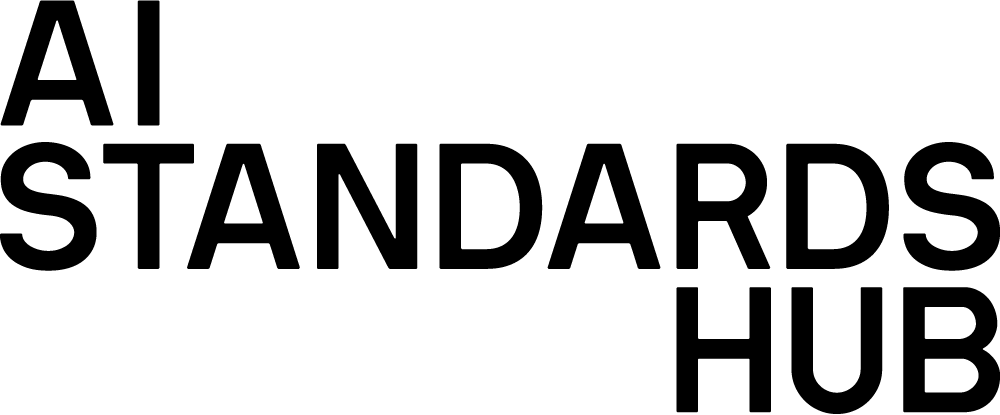This blog post provides some detail on what the AI Standards Hub is, how we built it, and why we hope you will join us on the journey.

What is the Hub for?
Technical standards are rapidly becoming key tools for the development, adoption, and governance of AI technologies. At the same time, the AI standardisation landscape – inherently international and increasingly complex – is growing harder to navigate.
Enter the AI Standards Hub. The Hub aims to help stakeholders across industry, government and regulators, civil society, and academia understand, use, and develop standards. This website is the backbone of the Hub – the home of the Standards Database, as well as complimentary policy and research databases, online training materials, community forums, and much more. The Hub’s work will also extend far beyond the website and involve live events, strategic research, and international engagement.
All stakeholders can benefit from the Hub’s breadth and depth of knowledge – from AI-deploying companies interested in shaping the standards landscape, to regulators wondering how standards will affect their regulatory purview. We are dedicated to ensuring that a diverse range of voices engage with AI standards and standardisation. To this end, we aim to equip community members from all groups – including civil society organisations, SMEs, and other groups currently underrepresented in standardisation activities – with the knowledge and tools required to become actively involved with AI standards.
How did we build the Hub?
The Alan Turing Institute, alongside its partner organisations BSI and NPL, organised a series of six roundtables with representatives from key stakeholder groups: established companies developing AI, large companies procuring AI, AI start-ups, regulators, civil society and consumer groups, and experts working with Standards Development Organisations. The aim of the roundtables was twofold:
-
- To understand user needs – i.e., to understand how the AI Standards Hub could help stakeholders meet their objectives and overcome their challenges in navigating the world of AI standards
- To understand which thematic areas the Hub should focus on
We also conducted a survey of more than 300 interested individuals to gather additional insights on user understanding of, engagement with, and challenges related to standards. Through these outreach activities, we discovered that while stakeholders believe that AI standards are highly relevant to their goals and are very interested in both using and developing them, most have very little experience with standardisation. We asked each group to rate the importance of standards, along with their current level of thinking on the topic: for all groups, the importance they placed on standards outstripped the current extent of their thinking on the topic, demonstrating a clear need for the kind of work the Hub is set up to pursue.
The consulted stakeholders further solidified the case for the Hub by enthusiastically welcoming its proposed activities, noting that the AI Standards Database would be particularly helpful for achieving their goals.
What will the Hub do?
The Hub’s activities will coalesce around four main pillars:
1. Observatory: The AI Standards Database tracks and displays relevant published standards and standards development projects. This is accompanied by a database for AI-related policy documents from governmental or other official sources in the UK and around the world.
2. Community and collaboration: The Hub will serve as a home for the AI standards community, facilitating new connections, coordination, exchange of ideas, and collaborative problem-solving through online forums and live events.
3. Knowledge and training: The Hub will publish e-learning modules and host training events with a focus on the kinds of knowledge needed to effectively engage with the field of AI standardisation.
4. Research and analysis: The Hub will produce and share strategic insights to support the evolution of a participatory, technically and ethically sound, coherent, and effective global AI standards landscape.
Why should you use the Hub?
The Hub will aid and equip a wide array of stakeholders to achieve their objectives with respect to AI standardisation.
Companies that develop or adopt AI solutions will have ready access to training modules and events, advice, and case studies on how to both adopt and shape standards. Some of these resources will be particularly valuable for start-ups and SMEs.
Regulators and policymaker will be able to gain new, issue- or sector-specific insight into standards and standardisation initiatives that are relevant to their regulatory objectives, as well as to strategic research on the relationship between AI standards and other governance tools.
Civil society and consumer groups, often underrepresented in standards development, will be able to gain the skills and knowledge needed to get involved, from an increased awareness of how AI interacts with and impacts the people they represent, to a thorough grasp of how SDO working groups operate and how they can successfully contribute to standards development processes.
Academic researchers, similarly underrepresented in standards projects, will benefit from the Hub’s guidance on standards development, but also through access to information that can inform research about AI standards or help with the incorporation of standardisation-related considerations into the design of technical research.



0 Comments